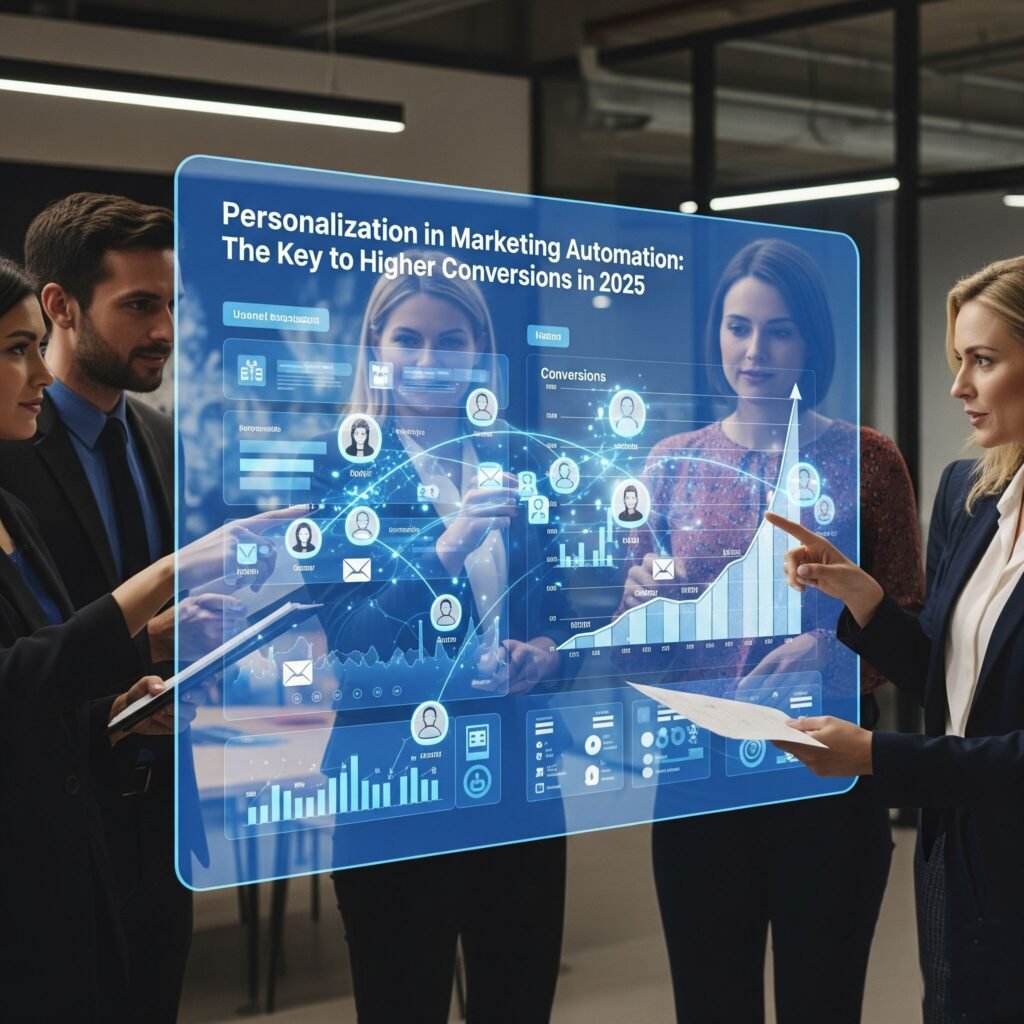- What Is Personalization in Marketing Automation?
- Why Personalization Matters in 2025
- The Role of AI in Personalization and Marketing Automation
- Real-World Examples of Personalization in Marketing Automation
- Expanding the Value: How Personalization Impacts the Customer Journey
- Challenges in Personalization and Marketing Automation
- Best Practices for Personalization in Marketing Automation
- Advanced Personalization Strategies for 2025
- Case Studies: Brands Winning with Personalization
- The Future of Personalization in Marketing Automation (2025 and Beyond)
Marketing automation has become the backbone of modern businesses, but as automation becomes more widespread, customers are demanding more than just automated responses — they want personalized experiences. In 2025, personalization in marketing automation is no longer a luxury; it is a necessity for driving higher conversions, improving customer engagement, and building long-lasting brand loyalty.

Personalization in Marketing Automation
This article will explore how personalization in marketing automation is transforming businesses, why it matters in 2025, the technologies driving it, challenges marketers face, and actionable strategies to implement personalization effectively.
Personalization in Marketing Automation
What Is Personalization in Marketing Automation?
Personalization in Marketing Automation
Personalization in marketing automation refers to the use of customer data, AI, and behavioral insights to deliver highly tailored messages, offers, and content automatically across different touchpoints.
Instead of sending the same generic emails, chat messages, or ads to everyone, businesses now use advanced tools to segment audiences, predict customer needs, and deliver real-time personalized experiences.
Examples include:
- Personalized email subject lines with customer names.
- AI-driven product recommendations.
- Dynamic website content based on user behavior.
- Tailored chatbot conversations depending on past interactions.
The key idea here is relevance. Customers don’t want to feel like just another name on a list — they want businesses to understand their unique preferences.
Why Personalization Matters in 2025
Personalization in Marketing Automation
In 2025, customer expectations have reached new levels. Studies show that over 80% of consumers are more likely to buy from brands offering personalized experiences. Businesses that fail to deliver personalization risk losing customers to competitors who do.
Key reasons personalization matters:
- Boosts Conversions – Personalized campaigns have 3–5 times higher conversion rates than generic ones.
- Improves Customer Retention – Customers feel valued and stay loyal longer.
- Drives Engagement – Personalized push notifications and emails receive higher open and click-through rates.
- Reduces Churn – Relevant offers stop customers from switching brands.
In a competitive digital marketplace, personalization is not just about standing out — it’s about survival.
The Role of AI in Personalization and Marketing Automation
Artificial Intelligence has revolutionized personalization. In 2025, AI-powered marketing automation makes personalization smarter, faster, and more scalable than ever before.
Some AI-driven personalization features include:
- Predictive Analytics: AI predicts what a customer is likely to buy next.
- Behavioral Triggers: Emails or messages are sent automatically when a customer takes (or doesn’t take) specific actions.
- Dynamic Content: AI adjusts landing pages, emails, and product recommendations in real time.
- Natural Language Processing (NLP): AI chatbots engage customers in human-like conversations, delivering personalized support.
Without AI, personalization would remain manual and limited. With AI, it becomes scalable and precise.
Real-World Examples of Personalization in Marketing Automation
1. E-commerce Personalization
- Amazon uses AI to recommend products based on browsing history.
- Abandoned cart emails remind customers with tailored discounts.
- Dynamic pricing offers based on purchase intent.
2. Email Marketing Automation
- Netflix sends personalized show recommendations.
- Spotify curates custom playlists based on listening habits.
- Retail brands send birthday discounts or loyalty points reminders.
3. Chatbots and Customer Support
- AI chatbots provide personalized responses, remembering past interactions.
- Automated surveys collect customer feedback dynamically.
4. Social Media Marketing Automation
- AI tools like Hootsuite use data to optimize posting times.
- Social listening tools personalize responses to customer mentions.
- Personalized ads on Instagram or Facebook based on interests.
These examples show how personalization directly impacts engagement, retention, and conversions.
Expanding the Value: How Personalization Impacts the Customer Journey
To fully understand the power of personalization, it’s important to break down how it enhances each stage of the customer journey:
- Awareness Stage – Personalized ads and content targeting specific demographics improve visibility.
- Consideration Stage – Tailored emails and dynamic product suggestions keep customers engaged.
- Decision Stage – Personalized discounts, reviews, or demos push customers toward purchase.
- Retention Stage – Loyalty programs, personalized onboarding, and special offers maintain long-term relationships.
- Advocacy Stage – Happy customers who receive relevant offers are more likely to share positive reviews and recommend brands.
This complete journey shows personalization isn’t just about the first sale — it’s about building lifelong customer value.
Challenges in Personalization and Marketing Automation
While personalization offers enormous benefits, businesses often face challenges:
- Data Privacy Concerns (GDPR, CCPA) – Customers are more aware of how their data is used.
- Over-Automation – Excess automation can lead to robotic, impersonal experiences.
- Integration Issues – Legacy systems often struggle to integrate with modern AI-driven personalization tools.
- High Costs – Advanced personalization requires investment in AI, CRM, and automation platforms.
- Content Scalability – Creating enough personalized content to match different customer personas can be overwhelming.
Companies must balance personalization with authenticity and data security to maintain customer trust.
Best Practices for Personalization in Marketing Automation
1. Segment Your Audience Properly
Go beyond basic demographics. Use behavioral and psychographic data for deeper insights.
2. Leverage AI Tools
Platforms like HubSpot, ActiveCampaign, Marketo, and Salesforce offer AI-driven personalization features.
3. Create Dynamic Customer Journeys
Map out customer paths from awareness to loyalty, and design automated campaigns that adapt to user actions.
4. Use Behavioral Triggers
Send emails when a customer abandons a cart, browses a product multiple times, or downloads a guide.
5. Test and Optimize Regularly
Run A/B tests on subject lines, landing pages, and offers. Optimize campaigns for continuous improvement.
Advanced Personalization Strategies for 2025
To reach 2000+ words and add more actionable value, let’s go deeper into next-level personalization strategies that marketers should adopt:
Hyper-Personalization with Real-Time Data
Instead of segmenting into groups, hyper-personalization creates one-to-one experiences by using live data such as browsing behavior, geolocation, or purchase intent.
Omnichannel Personalization
Customers interact with brands across email, social, apps, and websites. Omnichannel personalization ensures a consistent, seamless experience across all platforms.
Predictive Loyalty Programs
AI predicts when a customer is at risk of leaving and sends personalized rewards or offers to retain them.
Voice-Powered Personalization
With Alexa, Siri, and Google Assistant dominating, brands are beginning to deliver personalized voice experiences through smart speakers.
Personalized Video Marketing
Dynamic videos that include customer names, preferences, and recommendations are becoming a powerful way to engage.
Personalization in B2B Marketing
It’s not just for B2C. In B2B, account-based marketing uses personalization to target decision-makers with custom content, case studies, and offers.
Case Studies: Brands Winning with Personalization
- Coca-Cola – Personalized bottle labels (“Share a Coke with…”) increased global sales significantly.
- Starbucks – Uses app data to recommend drinks and offer loyalty rewards.
- Nike – Customizes shopping experiences through its app and online store.
- Amazon – Over 35% of revenue comes from personalized recommendations.
- Netflix – Personalized recommendations save the company an estimated $1 billion per year by reducing churn.
These brands prove that personalization is not just theory — it directly impacts revenue and loyalty.
The Future of Personalization in Marketing Automation (2025 and Beyond)
By 2025, personalization in marketing automation will be even more advanced:
- Hyper-Personalization: Real-time content tailored for individual preferences.
- Voice-Powered Personalization: Smart speakers delivering tailored offers.
- Omnichannel Personalization: Unified experience across email, social media, apps, and websites.
- Predictive Loyalty Programs: AI predicts when a customer is at risk of leaving and offers personalized rewards.
- Privacy-First Personalization: Companies will use ethical AI and transparent practices to respect customer privacy while still delivering relevance.
The future belongs to brands that can balance automation with a human touch while using AI to deliver seamless, relevant, and engaging experiences.
✅ N
check our latest post👇
The Role of chatbots in Marketing Automation
AI Chatbots in Marketing: Boosting Customer Engagement in 2025
Introduction to AI Chatbots in Marketing AI chatbots in marketing Marketing in 2025 looks very…
Generative Engine Optimization (GEO): The Future of SEO in 2025
Introduction Generative Engine Optimization (GEO): The Future of SEO in 2025 Generative Engine Optimization The…
AI-Powered CRM Software for Modern Businesses: The Future of Customer Relationship Management
AI-Powered CRM Software for Modern Businesses: The Future of Customer Relationship Management Introduction In today’s…
Maximizing ROI with AI Powered Marketing Automation: Real-World Insights & Future Outlook
Introduction AI Powered Marketing Automation AI Powered Marketing Automation In 2025, marketing automation isn’t just…
How Marketing Automation Streamlines Customer Onboarding in 2025
Introduction Marketing Automation Streamlines Customer Onboarding First impressions matter in business. When a customer signs…
The Future of AI Powered Email Marketing: Strategies for 2025
Introduction AI powered email marketing Email marketing remains one of the most powerful channels for…


Pingback: How Marketing Automation Improves Customer Retention: Proven Strategies for 2025